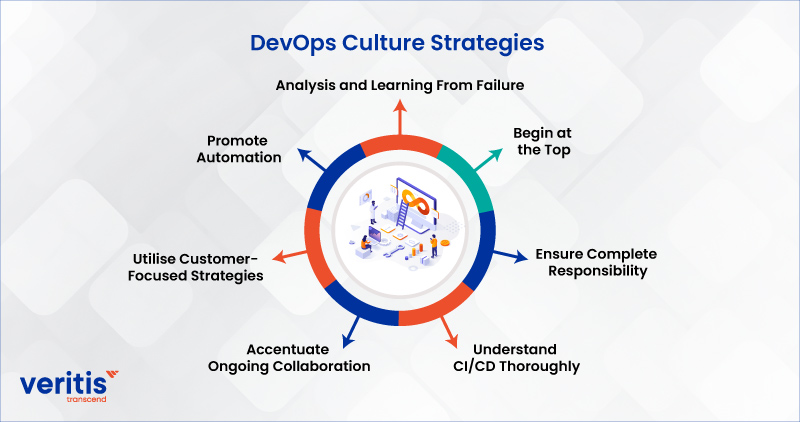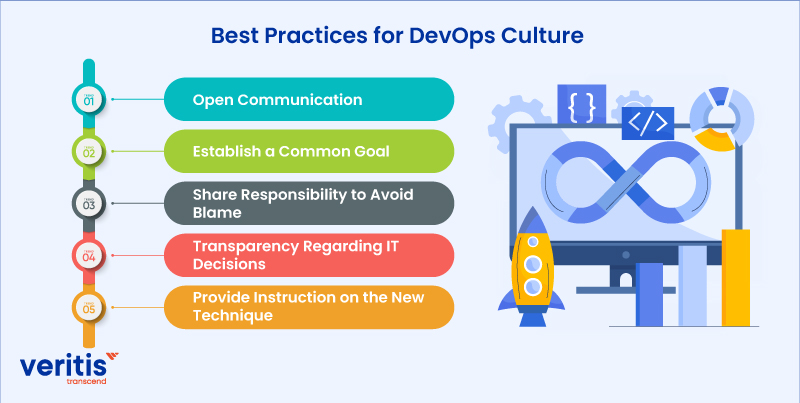
DevOps is an acronym for development and operations. These technological perfections are what digital firms seek. It’s a cycle of continuous improvements made possible by investments in people and processes, not a plaque you hang on the wall. We want to educate the CEOs, CTOs, and their teams to develop a DevOps culture.
DevOps is a crucial element that provides tailwinds for the agile transformation path. Developing a DevOps culture strives to disrupt the organizational hierarchy’s siloed structures and elevate communication, shared accountability, and cooperation. The outcome includes a reduced time to market, minimized technical debt, and enhanced product development.
The DevOps team collaborates to provide a product that performs well across the board, including requirement adherence, design, development, testing, deployment, and maintenance. The group can accomplish considerably more as a team than we can alone.
With a market share of 47%, DevOps is the most popular software development technique worldwide. By DevOps implementation, you may enhance software quality by 63%, speed up releases by 63%, and boost team communication by 55%. Emphasizing ongoing cooperation between development and operations teams.
However, fostering a DevOps environment within your company is essential for maximizing these advantages. Before going in-depth about CTOs’ strategies to create a strong DevOps culture. Let’s look at what DevOps culture is and what best practices are.
What is DevOps Culture?
DevOps, a blended term for development and operations, embodies an organizational shift towards implementing practices that enhance the software development life cycle (SDLC). This shift emphasizes the use of accurate terminology and fosters cultural change. It allows development and operations teams to collaborate and communicate seamlessly, increasing productivity.
Teams must concentrate on product quality and delivery speed by:
- Automation
- Collective efforts
- Reply to all stakeholders’ feedback
The business itself is also expected to:
- Enabling independent teamwork
- Remove silos between departments
- Adopt governance controls and guidelines that support autonomous and automated SDLC procedures
DevOps offers a continuous improvement system with the help of numerous contributing teams and individuals working together along the SDLC pipeline.
Useful link: DevOps Implementation in Manufacturing Sector: Meet the Culture-Driven Approach!
DevOps Culture Strategies

The following seven DevOps strategies can help CEOs and CTOs to create a robust DevOps culture.
1) Promote Automation
Concentrating on automating anything that can be automated is crucial because it constitutes one of the fundamental components of DevOps transformation. Even though the initial setup may require some time, it will save time and resources. Even while the initial setup may take some time, it will save time and resources.
Furthermore, automation eliminates the requirement for human intervention, effectively reducing the likelihood of errors. Unforeseen production errors have the potential to hinder productivity. But employing automated testing techniques can effectively mitigate this risk.
2) Utilise Customer-Focused Strategies
The success of any firm depends on maintaining customer satisfaction. Every DevOps strategy and best practice emphasizes maintaining a customer centric perspective. Therefore, CTOs should prioritize making the company profitable and developing features that address consumer needs.
As CTO, you are aware that resolving particular client issues increases revenues. Delivering a scalable, dependable, and resilient solution will be more accessible by keeping end users at the center of every approach.
3) Accentuate Ongoing Collaboration
The core concept of DevOps strategy is bringing all together to work towards a common goal. This necessitates ongoing collaboration and communication. Therefore, CTOs should create a channel of constant communication between the development team and the production team.
As a result, silos will be broken, and different groups will better understand one another’s viewpoints and difficulties. As a result, the project is delivered more smoothly, quickly, and with fewer faults since they communicate openly and frequently.
4) Understand CI/CD Thoroughly
To create a DevOps culture, CTOs must completely comprehend and put into practice the CI/CD principles. It allows the development team to automate deployments from development to production.
The practical application of CI/CD offers quicker feedback, easier deployment, quicker mistake identification, etc. From a business standpoint, CI/CD can also facilitate quicker time-to-market and assist you in developing a base of devoted customers with reliable products.
5) Ensure Complete Responsibility
CTOs must ensure end-to-end accountability while DevOps implementation by explicitly defining the roles and functions of each team. For instance, developers aren’t only in charge of producing code; the production team isn’t just in charge of deployment.
Both teams should cooperate closely and assume responsibility for the whole software development lifecycle as part of the DevOps environment. This puts an end to assigning blame and dramatically boosts productivity.
6) Begin at the Top
Buy-in should begin at the top of a DevOps goals to be successfully implemented. It sends a clear message to the junior members when high management and C-level executives accept the change.
Adopting the DevOps methodologies require leadership commitment to digital transformation. Encourage experimentation and knowledge sharing, and be prepared to accept significant changes.
7) Analysis and Learning From Failure
Every failure and error has a lesson to be learned. It would help if you embraced that in your role as CTO. You will advance in modern IT by maintaining an analytical and upbeat attitude while accepting failures.
DevOps practices place a strong emphasis on daily reflection and learning. Consider interviewing team members for an honest failure assessment. It will assist the organization in handling such events successfully and implementing significant changes.
Useful link: 3 Ways to Build A Successful DevOps Testing Culture
Best Practices for DevOps Culture

Implement the following best practices to create a strong DevOps culture.
1) Open Communication
Without transparent and open communication, DevOps can exist. Your DevOps transformation development will accelerate by creating a secure space for open discussion because it will allow team members to express their ideas, concerns, or suggestions. Additionally, open communication fosters trust, ensuring that everyone feels appreciated, included, and at ease while offering their opinions.
2) Establish a Common Goal
A clear strategy outlining the desired direction and the approach to reaching it can effectively guide and motivate teams. Set a common goal that everyone collaborates to achieve. To ensure success, everyone must concur on the rationale behind and comprehend the advantages of DevOps transformation. To keep teams from losing interest or being discouraged by a lack of progress, ensure the goals are acceptable and attainable.
3) Share Responsibility to Avoid Blame
Teams must take turns carrying out the initiative for DevOps principles to succeed. Everyone engaged needs to understand exactly what is and isn’t functioning. Set expectations, budgets, and deadlines that are distinct and reasonable.
Another crucial aspect of the DevOps methodologies is that when something goes wrong, nobody is to blame but everyone involved. Avoid pointing fingers: Instead of criticizing specific people when teams miss a deadline or anything goes wrong, use the situation as a teaching opportunity. Conduct blameless postmortems to eliminate the anxiety and stress frequently connected with incident evaluations.
4) Transparency Regarding IT Decisions
Everyone working for the company should know the DevOps practices in place and the decision-making process, including management, stakeholders, and operations employees. To ensure problem-solving is a team effort, share information and data gathered across all departments.
Transparency also promotes trust between teams that would not often collaborate. The rate of software project development can accelerate by letting teams know that management will support their decision to experiment.
5) Provide Instruction on the New Technique
Teams must have the proper training and effective communication to accomplish their goals. Do not instantly integrate them into DevOps methodologies and expect to see benefits. Start by enrolling in DevOps training programs and certifications to hone your abilities, or organize a DevOps Dojo training so your staff members can advance as a team.
Conclusion
DevOps implementation culture might take a lot of work for an organization. Applying the principles and techniques of DevOps cannot happen quickly. To be successful, the team as a whole must be dedicated, dynamic, and persistent. However, suppose CTOs and CEOs are willing to experiment, learn from mistakes, and accept significant changes. In that case, adopting a DevOps strategy can assist companies in becoming more agile, collaborative, and successful.
CEOs and CTOs must prioritize building a high-performing DevOps culture. Organizations can achieve enhanced agility and efficiency in software development and delivery by fostering a collaborative environment, investing in automation, and tooling, and promoting a culture of shared responsibility. Continuous improvement, learning, and data-driven decision-making further contribute to success in the rapidly evolving technology landscape.
Veritis, the Stevie Awards winner for DevOps, offers all-encompassing DevOps principles that emphasize collaboration, automation, and fostering a culture of continuous improvement by actively engaging testing teams and cultivating a shared responsibility for quality assurance. Veritis facilitates expedited and dependable software deployments, enhancing customer satisfaction and overall business prosperity.
Got Questions? Schedule A Call
Also Read:
- Why Should You Adopt DevOps and What are the Benefits it Offers?
- Explained: Pros and Cons of DevOps Methodology and its Principles
- How to Implement Artificial Intelligence in DevOps Transformation?
- Why Data Driven Culture is Important for You
- DevOps outsourcing: Things to Know About Before Getting Started